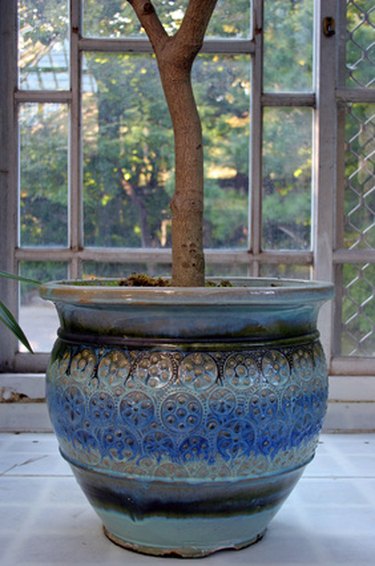
Indoor plants, particularly large leafy varieties, often harbor unwanted bugs. In essence, a potted plant is like a very small natural habitat, with soil, water and growing plant life. It's no surprise that they can attract a range of irritating insects. While many of these bugs don't sting, bite or cause serious damage indoors, some species pose a small risk to humans. Dealing with the bugs when you find them can keep them from spreading.
Problem
Video of the Day
Plants that spend the summer outdoors before being taken back inside as the weather cools often carry pests into the home. Even if kept indoors throughout the year, a potted plant makes a shaded and safe spot for any insects that venture into the house. Many will see plants as a food source, whether they eat leaves or prey on leaf-eating bugs. Some insects burrow into the soil or hide on the underside of plant leaves to avoid detection.
Video of the Day
Species
The insects that hitch a ride in your potted plants will vary depending on where you live and what type of plant you have. However, several common biting insects that live in potted plants include thrips, ants, mosquitoes and some mites. Sometimes, wasps, bees and other stinging insects get into the house as potted plant stowaways. On rare occasions, houseplants might contain spiders that are capable of biting. Ants may quickly find ways to draw more of the colony into the house if they find food, so dealing with them quickly is essential.
Treatment
Most common indoor pest insects will die off with the right dose of safe indoor pesticides. Botanical and organic pesticides containing azadirachtin, pyrethrins or neem often work best with the least risk. Sprays allow you to target the affected area around the plant in the case of infestations. Target larger insects such as spiders and wasps individually. As with all insecticides, check your state laws for permitted products and always closely follow package instructions. For bite treatment, calamine lotion or other soothing ointment will take the edge off the pain.
Prevention
Treating pots before you take them indoors helps reduce the chances of bringing biting insects inside. The University of Vermont's Dr. Leonard Perry suggests bathing the pots in a tub of lukewarm water for quarter of an hour to force any bugs from the pot. Changing the potting soil also helps rid the soil of larvae or bugs ready to hatch.
- AgriLife Extension Texas A&M University: Diagnosing Mysterious “Bug Bites”; Michael Merchant
- University of Missouri Extension: Least-Toxic Control Methods to Manage Indoor Plant Pests; Bruce A. Barrett; 2008
- AgriLife Extension Texas A&M University: House-Infesting Ants and Their Management; Bastiaan M. Drees and Bil Summerlin
- University of Vermont: Bringing Houseplants Indoors For The Winter; Dr. Leonard Perry